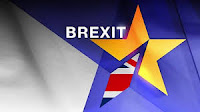Britain has a services-based economy: 80% of our output and employment is in services. Professional services, finance, travel, telecoms/computing are all key areas, as is degree to which retail sales are online. This is clearly an advantage for a set of islands when it comes to exports, because services don't need to be shipped. But services may be subject to other trade barriers, such as licensing requirements when offered in other countries, as well as unfair trade practices by local competitors and suppliers. Rules and how well they're enforced are important issues. About half our trade is with the EU, because it's closer than the rest of the world. The EU is also a market of 448m people, 412m of whom are internet users, with 288m online shoppers. That makes enforcement of the EU's new Digital Markets and Digital Services Acts all the more critical, regardless of the fact that the UK no longer sits at the regulatory table.
Scale of UK services exports to the EU
While we generally import more than we export, that overall trade deficit being £33bn in 2023. That's the result of a deficit of £187bn in goods imported over exports, offset by a surplus of £153bn in exported services (including services that overseas customers bought here in the UK, as well as services performed by UK firms working abroad).
Brexit has obviously made the EU market less accessible for UK firms, so the loss of the free movement in goods, services, people and capital makes earlier comparisons unreliable. But based on trade data for 2022:
- the EU accounts for 36% of Britain's total services exports;
- we have a trade surplus in services with 14 EU countries and a deficit of trade in services with 13 countries, our closest neighbour being the largest surplus (Ireland at £14 billion) and Spain the largest services deficit (£11 billion);
- our single largest type of exported service was £55bn worth of “other business services”, being legal, accounting, advertising, research and development, architectural, engineering and other professional and technical services, representing 38% of all UK service exports to the EU.
- exports of financial, travel and telecoms/computing/data services are also very significant.
The Importance of Digital Platforms
You can see from the nature of our most successful services exports that their marketing and supply depends on digital platforms and related services, including search engines, cloud/hosting, app stores, browsers, e-commerce marketplaces and messaging services.
While most of the services exported by British businesses will be supplied electronically to EU businesses of varying sizes, the online consumer markets are obviously also very important. In the retail sector, over a third of British business is now online, making the UK the third largest country in terms of the share of retail that is e-commerce, after the US and China. By contrast, about 15.4% of retail sales across all EU countries occur online. In absolute terms, however, the UK only has a domestic market of 66m internet users, while the EU has 412m (92%) of its population using the internet, 70% of whom (288m) buy stuff online.
At that scale it becomes very important that the EU's digital markets are well regulated, and that businesses and their customers are shielded from unfair competition and trade practices.
How Does the EU Ensure Fair Digital Markets?
The Digital Markets Act (DMA) builds on existing competition law by rooting out unfair practices of very large digital platform operators (“gatekeepers”) when providing services that other businesses use to reach their own customers online. Alphabet, Amazon, Apple, ByteDance, Meta and Microsoft have all been designated as gatekeepers, since they effectively act as private rule-makers who could potentially create ‘bottlenecks’ and ‘choke points’ that limit access, unfairly exploit personal and business data for their own purposes and/or impose unfair conditions on market participants. All face exploratory investigations under the DMA by the European Commission in connection with search services, app stores, browsers and messaging services, to see if they might be luring away customers from other businesses who use those platform services.
The EU's Digital Services Act (DSA), on the other hand, protects EU-based users of online communication, e-commerce, hosting and search services, by exempting intermediary service providers (“ISPs”) from certain liability for performing certain duties. There are extra requirements for ISPs with at least 45m average monthly active EU users (known as ‘very large online’ (or 'VLO') platforms and search engines). Even UK providers may be caught, where it has an entity based in the EU or has a 'substantial connection' with the EU (i.e. a significant number of users as a proportion of the EU population or by targeting its activities at one or more EU countries). Services such as Bing, Google Search, Facebook, Instagram, Snapchat, TikTok, YouTube, X/Twitter, AliExpress and LinkedIn already face exploratory investigations under the DSA. Basically, the European Commission wants to know how these businesses:
- mitigate the risks of creating and spreading information using generative AI and risks to electoral processes;
- block illegal content;
- protect users' fundamental rights;
- avoid promoting gender-based violence;
- protect children;
- protect users' mental well-being;
- protect users' personal data;
- protect consumers; and
- avoid the infringement of copyright and other intellectual property rights.
How Do British Businesses Benefit From the DMA and DSA?
British businesses will not want to spend heavily to acquire and deal with customers via gatekeepers' services, only to see the gatekeepers take those customers on directly. That's where the DMA comes in. It should not matter that a foreign business is among those who suffer any violation, since that will also affect EU businesses and customers that the DMA is primarily designed to benefit.
More widely, British businesses trading online the EU customers should also be reassured that the DSA regime is designed to ensure those customers are treated well and fairly in the intermediary environments. Otherwise, they risk losing both the channels through which they attract and deal with EU customers and/or the EU customers who are unwilling to engage with those channels. Equally, businesses will want to know that they are taking on genuine customers and dealing with reputable service providers online, rather than risking exposure to fraud and intellectual property rights infringement via their EU sales and marketing channels.
Either way, it's clear that Britain's service exporters are highly dependent on the EU trade bloc and its regulatory regime, regardless of Brexit.
Whether they can expect the same protection at home is another matter...






















